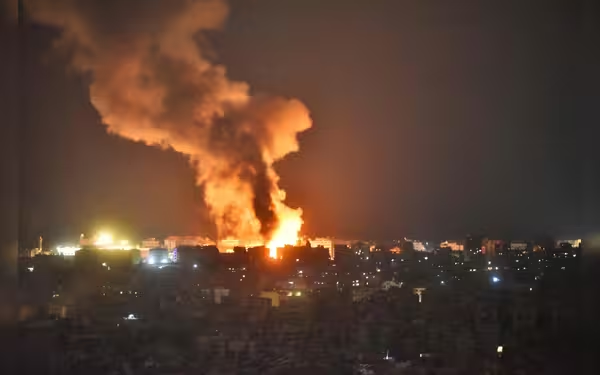Saturday, November 16, 2024 07:29 PM
Israeli Air Strikes Target Palestinian Refugee Camp and Hezbollah Media in Beirut
- Israeli air strikes hit Palestinian refugee camp in Lebanon.
- Hezbollah media facilities targeted amid escalating conflict.
- Over 1.2 million displaced as violence intensifies in Lebanon.
 Image Credits: arabnewspk
Image Credits: arabnewspkIsraeli air strikes target a Palestinian refugee camp and Hezbollah media in Beirut, escalating the humanitarian crisis in Lebanon.
In recent days, the conflict between Israel and militant groups in Lebanon has escalated dramatically, leading to significant military actions and civilian displacement. The situation has become increasingly dire as Israeli air strikes have targeted various locations in Lebanon, including a Palestinian refugee camp and media facilities associated with Hezbollah. This surge in violence marks a troubling chapter in the ongoing tensions in the region, which have been exacerbated by the recent war in Gaza.
Late Saturday night, powerful explosions shook the southern suburbs of Beirut, signaling a new phase in Israel's military operations. For the first time, Israeli forces struck a Palestinian refugee camp in northern Lebanon, aiming at both Hezbollah and Hamas fighters. Residents in several neighborhoods, including Haret Hreik and Choueifat, were urged to evacuate as the blasts illuminated the night sky. The explosions followed a day filled with sporadic strikes and the constant presence of reconnaissance drones overhead.
Among the buildings targeted was one housing the studios of Hezbollah’s Al-Manar TV channel, highlighting the conflict's reach into media and communication. Reports indicated that a facility storing oxygen tanks was also hit, although the owner later denied this claim. The violence has led to widespread panic, with thousands of people, including Palestinian refugees from the Sabra and Shatila camps, fleeing the area in search of safety.
As the situation unfolded, Israel's military confirmed its operations near Beirut, stating that around 30 projectiles had crossed from Lebanon into Israeli territory, with some intercepted. In response, Hezbollah claimed to have successfully targeted Israeli soldiers in northern Israel, further escalating the cycle of retaliation. The conflict has already resulted in significant casualties, with reports indicating that at least 1,400 Lebanese, including civilians and Hezbollah fighters, have lost their lives since the onset of hostilities.
The humanitarian impact of this conflict is profound. Nearly 1.2 million people have been displaced from their homes in Lebanon, and the situation continues to deteriorate. Many families are now living in makeshift shelters, struggling to find safety amid the chaos. The streets of Beirut are filled with confusion as people rush to escape the violence, with some even crossing into Syria to seek refuge.
As the conflict rages on, the international community watches closely, with calls for a ceasefire growing louder. Iran's foreign minister has expressed a desire to reach a ceasefire in both Gaza and Lebanon, indicating that diplomatic efforts may be underway. However, Israeli Prime Minister Benjamin Netanyahu has made it clear that Israel will continue to defend itself against attacks, stating, "Israel has the duty and the right to defend itself and respond to these attacks, and it will do so." This statement underscores the complexity of the situation, where military actions are often justified by national security concerns.
The ongoing conflict in Lebanon and its spillover effects into Israel highlight the urgent need for a resolution to the violence. As families continue to flee their homes and the death toll rises, the humanitarian crisis deepens. It is crucial for the international community to engage in meaningful dialogue to address the root causes of this conflict and work towards a sustainable peace that ensures the safety and dignity of all affected populations. The situation remains fluid, and the hope for peace hangs in the balance as the world watches and waits for a resolution.













